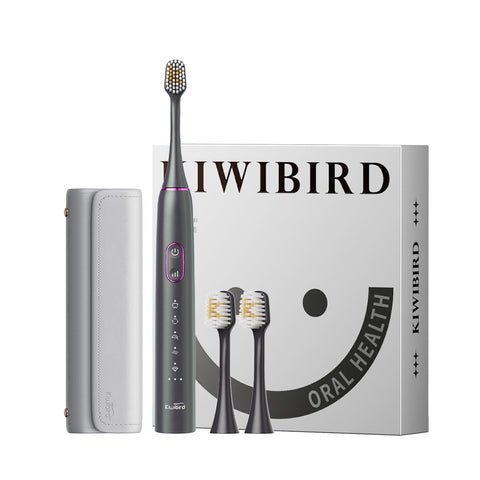
En lo que respecta a la higiene bucal, el tipo de cepillo de dientes que utilice puede afectar significativamente a su salud bucal. El debate entre los cepillos de dientes eléctricos y manuales sigue abierto, y los defensores de ambos bandos destacan los beneficios de sus métodos preferidos. Este artículo analiza las diferencias entre los cepillos de dientes eléctricos y manuales para ayudarle a determinar cuál es el más adecuado para sus necesidades de salud bucal.
Eficacia en la eliminación de placa
El objetivo principal de cualquier cepillo de dientes es eliminar la placa y evitar la acumulación de sarro, que puede provocar caries y enfermedades de las encías. Los estudios han demostrado que los cepillos de dientes eléctricos tienen una ligera ventaja sobre los cepillos de dientes manuales en términos de su capacidad para eliminar la placa. Esto se debe a las cerdas oscilantes o vibratorias de los cepillos de dientes eléctricos, que proporcionan un movimiento adicional que puede ayudar a desalojar la placa de manera más efectiva que la acción del cepillado manual solo.
Los cepillos de dientes eléctricos son especialmente beneficiosos para las personas que usan aparatos de ortodoncia, como los brackets, ya que pueden limpiar alrededor de los alambres y brackets de manera más eficiente que los cepillos manuales. También son ideales para personas con movilidad limitada, como las que padecen artritis, ya que requieren menos esfuerzo manual para su uso.
Salud de las encías
La salud de las encías es otro aspecto fundamental de la higiene bucal. Los cepillos de dientes eléctricos suelen considerarse mejores para las encías, ya que vienen equipados con sensores de presión que evitan que los usuarios se cepillen con demasiada fuerza. Cepillarse los dientes con demasiada fuerza con un cepillo de dientes manual puede dañar las encías y el esmalte, lo que provoca retracción de las encías y mayor sensibilidad. Los movimientos automáticos de las cerdas de los cepillos de dientes eléctricos garantizan que se aplique la presión adecuada, lo que proporciona un suave masaje a las encías que favorece la circulación sanguínea y la salud de las encías.
Facilidad de uso
En términos de facilidad de uso, los cepillos de dientes eléctricos ofrecen varias características que pueden hacer que el proceso de cepillado sea más sencillo y eficaz. Muchos modelos vienen con temporizadores integrados que garantizan que los usuarios se cepillen durante los dos minutos recomendados por los dentistas, con intervalos que le indican que debe pasar a diferentes partes de la boca. Esto puede ser especialmente útil para los niños y para aquellos que tienden a acortar sus sesiones de cepillado.
Sin embargo, los cepillos de dientes manuales tienen la ventaja de ser fáciles de usar, no necesitan pilas ni recarga, son más fáciles de transportar y, por lo general, más económicos que los modelos eléctricos.
Costo y mantenimiento
El costo inicial de un cepillo de dientes eléctrico es más alto que el de un cepillo de dientes manual. Los cepillos de dientes eléctricos también requieren un mantenimiento constante, que incluye el reemplazo de la batería o la carga y el reemplazo de los cabezales del cepillo cada pocos meses, lo que puede aumentar el costo. En cambio, los cepillos de dientes manuales son económicos y se pueden encontrar en prácticamente cualquier tienda de conveniencia, lo que hace que sea fácil reemplazarlos.
Consideraciones ambientales
Desde una perspectiva medioambiental, los cepillos de dientes manuales tienen una huella de carbono menor que los eléctricos. Aunque siguen estando fabricados principalmente con plástico, no contienen los componentes electrónicos ni las baterías recargables que contienen los cepillos de dientes eléctricos, que pueden resultar más difíciles de desechar de forma responsable.
Conclusión
La elección entre un cepillo de dientes eléctrico y uno manual depende en última instancia de las preferencias personales y de las necesidades específicas. Si necesita eliminar la placa a fondo debido a los aparatos de ortodoncia, tiene una destreza manual limitada o simplemente prefiere la facilidad de uso y las funciones que ofrecen los cepillos de dientes eléctricos, estos pueden ser la mejor opción. Sin embargo, si prefiere la simplicidad, le preocupa el costo o es más consciente del impacto ambiental, un cepillo de dientes manual puede ser más apropiado. Independientemente de su elección, la clave para una buena salud bucal es la técnica de cepillado correcta y constante, junto con controles dentales regulares.








